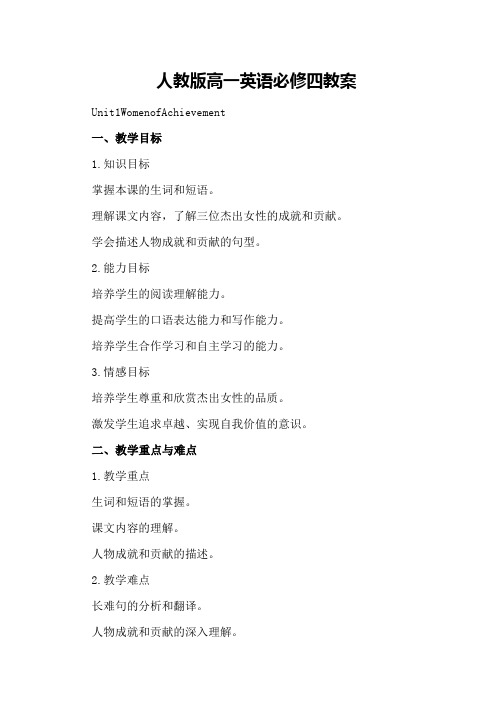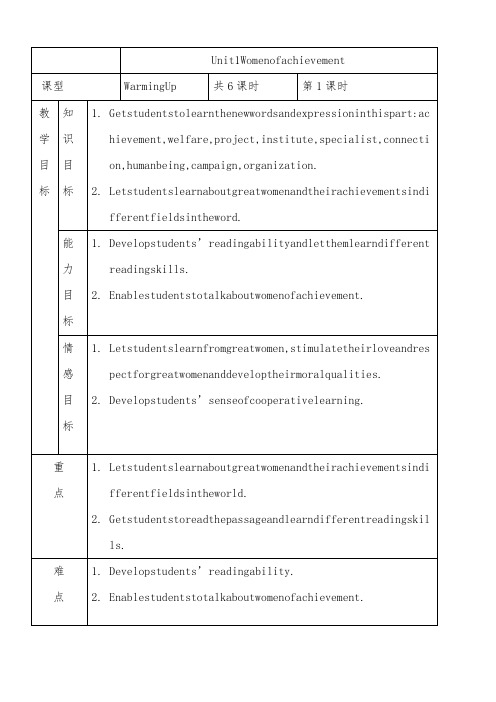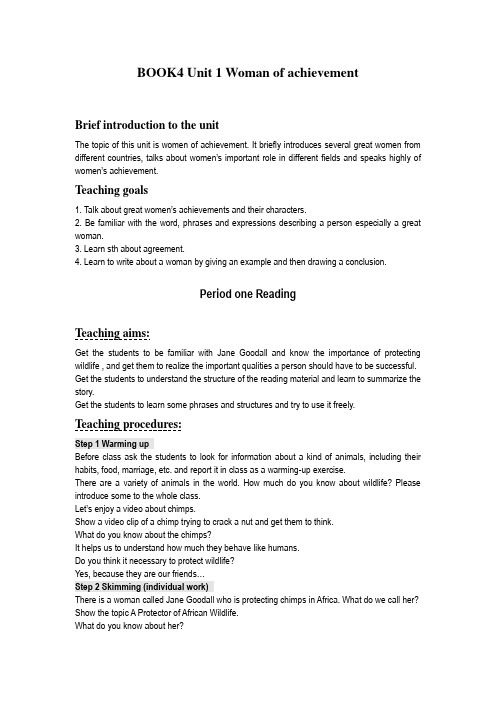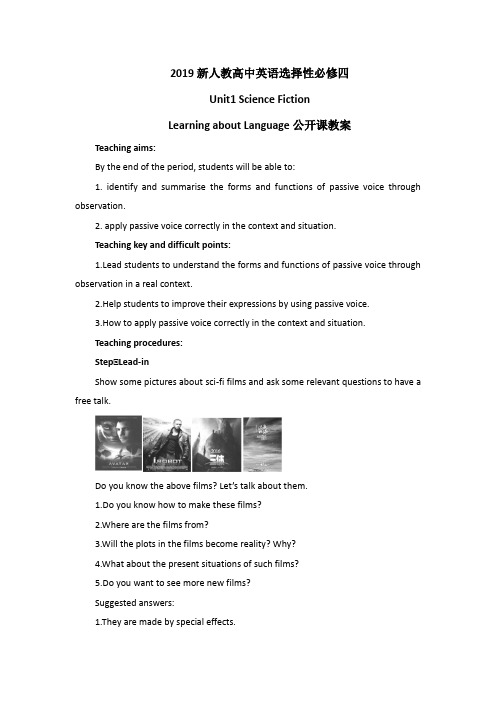高中英语必修四第一单元教案
最新高中英语必修四第一单元教案资料

用具
Multimedia & blackboard
教
学
过
程
Step 1 Leading in
Have a free talk with students, ask them the following questions:
1.Do you know any great women in the history?
Unit 1 Women of achievement
课型
Warming Up
共6课时
第1课时
教学目标
知识目标
1.Get students to learn the new words and expression in this part: achievement, welfare,project, institute,specialist, connection, human being, campaign, organization.
Less time was spent with her husband and family.
Song Qingling
To work for civil rights, democracy and peace.
Her relatives had political opinions completely different from her.
Women were not allowed to fight like a man.
She lost her life.
Elizabeth Fry
To help improve prison conditions.
She was criticized for neglecting her family and enjoying fame.
人教版高一英语必修四教案

人教版高一英语必修四教案Unit1WomenofAchievement一、教学目标1.知识目标掌握本课的生词和短语。
理解课文内容,了解三位杰出女性的成就和贡献。
学会描述人物成就和贡献的句型。
2.能力目标培养学生的阅读理解能力。
提高学生的口语表达能力和写作能力。
培养学生合作学习和自主学习的能力。
3.情感目标培养学生尊重和欣赏杰出女性的品质。
激发学生追求卓越、实现自我价值的意识。
二、教学重点与难点1.教学重点生词和短语的掌握。
课文内容的理解。
人物成就和贡献的描述。
2.教学难点长难句的分析和翻译。
人物成就和贡献的深入理解。
三、教学过程Step1:导入利用图片或视频介绍三位杰出女性:玛丽·居里、宋庆龄和张海迪。
学生简单了解她们的成就,激发兴趣。
Step2:生词学习学生自主阅读课文,勾画出生词和短语。
教师带领学生朗读生词,解释词义,引导学生用生词造句。
Step3:课文阅读学生自主阅读课文,理解文章大意。
教师提问,检查学生对课文的理解。
学生分角色朗读课文,注意语音、语调。
Step4:分析课文教师引导学生分析课文结构,概括段落大意。
学生讨论三位杰出女性的成就和贡献,用所学句型进行描述。
教师点评并指导,帮助学生完善表达。
Step5:课堂活动学生分组,每组选择一位杰出女性,准备演讲稿。
各组轮流进行演讲,其他学生听后进行评价。
Step6:作业布置四、教学反思本节课通过学习三位杰出女性的故事,让学生了解她们的成就和贡献,培养学生的尊重和欣赏杰出女性的品质。
在教学过程中,教师应注重激发学生的兴趣,引导他们主动参与课堂活动,提高阅读理解能力。
同时,教师要关注学生的个体差异,给予不同层次的学生指导和帮助,提高他们的口语表达能力和写作能力。
教师还需不断反思自己的教学方法,针对学生的实际情况进行调整,使教学效果更佳。
在今后的教学中,教师可以尝试更多的课堂活动,如角色扮演、小组讨论等,让学生在实践中提高英语水平。
同时,教师还要注重培养学生的跨文化意识,帮助他们更好地理解和尊重不同文化背景下的人物成就和贡献。
人教新课标英语必修4全册教案(Unit1Womenofachie

人教新课标英语必修4全册教案(Unit1Womenofachie人教新课标英语必修4全册教案(Unit 1 Women of achievement) Unit 1 Women of achievement1. Target languagea. achieve, achievement, condition, welfare, institute, connection, campaign, organization, entertainment, inspire, support, devote ... tob. Watching a family of chimps wake up is our first activity of the day. P2Everybody sits and waits while the animals in the group begin to wake up and move. P2But the evening makes it all worthwhile. P2... we see them go to sleep together in their nest for the night. P22. Ability goalsa. Learn Warming Up, and know how to tell the great women and the famous women.b. Learn the way to describe a person from what the person did, what she/he looks like and so on.3. Learning ability goalsTeach Ss how to describe a person.Teaching important pointsa. By reading A protector of African wildlife, students can learn from Jane Goodall in at least two aspects:b. Ask students to answer these questions:1) What made her a great success?2) What should we learn from Jane Goodall?Teaching difficult pointsLet everyone believe that all of us can become Jane Goodall.Teaching methodsInspiration, Questioning and Discussion.Teaching aidsA computer, a projector and a recorder.The first period readingProceduresStep I. Warming upWarming up by describingGood morning, class. Today we are going to read about A PROTECTOR OF AFRICAN WILDLIFE. But first, I’d like to know if you have ever heard of women like Elizabeth Fry, Soong Chingling, Jane Goodall, Jody Williams, Joan of Arc and Lin Qiaozhi. Now turn to page 1, look at the photos, read the captions and describe to your neighbor the women in focus. Who is she? What is she? What did she do to benefit the world?Warming up by discussingHi, every one. How did you spend your winter vacation? Did you read any books? Did you read any women of achievement? What makes a woman of achievement? Now in pairs discuss the women on page one. Which of these women do you think is a great woman? Give reasons for your choice.Warming up by reading aloud and translatingNice to see you back at school, boys and girls. As you have all prepared lessons before class I shall ask six of you at random to read aloud and translate the captions under the photos on page one. Zhao Yanfei, would you try reading aloud and translating the first caption?Well done! Next let’s have Ju Xiaohong do the second one.Step II. Pre-reading1. Looking and sayingWork in pairs. Look at the photos and the title A PROTECTOR OF AFRICAN WILDLIFE and predict the contents of the text. When you are ready, join another pair and compare your predictions and the clues that helped you to make the predictions.(Key: From the photos and title I guess that the text tells about a woman scientist who is working in Africa to protect the wildlife there. She studies a family of chimps, delivers a speech on their behaviour, arguing for them to be left in the wild and protected. )2. Talking and sharingWork in groups of four. Tell your group mates what you know about wildlife protection. Then the group leader is to stand up and share your group idea with the class.(Key: I am from Group 3. We think that Jane is a woman of achievement. For she has helped people understand how much chimps behave like humans. Because of her we know that it is better for the animals to be left in the wild or in the special places set up for them. )Step III. Reading1. Reading aloud to the recordingNow please listen and read aloud to the recording of the text A PROTECTOR OF AFRICAN WILDLIFE. Pay attention to the pronunciation of each word and the pauses within each sentence.I will play the tape twice and you shall read aloud twice, too.2. Reading and underliningNext you are to read and underline all the useful expressions or collocations in the passage. Copy them to your notebook after class as homework.3. Reading to identify the topic sentence of each paragraphSkim the text and identify the topic sentence of each paragraph. You may find it either at the beginning, the middle or the end of the paragraph.(Key: 1st paragraph: Our group are all going to visit the chimps in the forest. 2nd paragraph: Nobody before has fully understood chimp behaviour. 3rd paragraph: For forty years Jane Goodall has been helping the rest of the world understand and respect the life of these animals.)4. Reading and transferring informationRead the text again to complete the table, which list what Jane does to protect African wildlife.What does Jane do?Studied these animals for many yearsSpent many years observing and recording their daily activitiesDiscovered that chimps hunt and eat meatDiscovered how chimps communicate with each otherArgued for chimps to be left in the wildSet up special placesWorking with animals in their own environment5. Reading and understanding difficult sentencesAs you have read the text times, you can surely tell which sentences are difficult to understand. Now put your questionsconcerning the difficult points to me the teacher.Step IV. Closing downClosing down by doing exercisesTo end the lesson you are to do the comprehending exercises No. 1 and 2. 2. Closing down by having a discussionDo you agree with Jane’s ideas? Why or why not?(Key: I agree with Jane’s idea, because leaving the animals in the wild is the only good way to protect them. The animals belong to the forest, just as we belong to the civilized world. ) What do you think is the best way to protect wildlife?(Key: I think the best way is to understand and respect the life of animals. Setting up special places where they can live safely is important and effective)Closing down by retelling the story of Jane GoodallI shall write some key words and expressions on the board. You are to retell the story of Jane Goodall according to these words.(Key: visit the chimps, watch the chimps, understand chimp behaviour, argue for…, set up special places)The second period Learning about LanguageAimsTo help students learn about subject-verb agreement.To help students discover and learn to use some useful words and expressions.To help students discover and learn to use some useful structures.ProceduresStepI. Warming upWarming up by discovering useful words and expressionsTurn to page 4 and do exercises No. 1, 2 ,3 and 4 first. Checkyour answers against your classmates’.Step II. Learning about grammar1. Reading and thinkingTurn to page 2 and read with me the text of A PROTECTOR OF AFRICAN WILDLIFE. As you read on, pay attention to the forms of sentence predicates and the subject-verb agreement shown in the sentences.(For reference: Our group are…, Watching a family of chimps is…, Nobody before has fully understood…)2. Doing exercises No. 1 and 2 on page 5Turn to page 5. Look at the two sentences: Our group are all going to visit the chimps in the forest. And Our group includes six boys and five girls. Have you noticed any difference between them? Yes. If the w ord “group ” refers to different members, use a plural verb. If the word “group” is considered as a whole, use a singular verb. Now fill in the blanks with the proper form of the given verbs in brackets on page 5. And then go on to do Exercise No. 2 on the same page, that is, fill in the correct verb form in the letter.Step III. Ready used materials for Subject-verb agreementWe all know these meanings of "agree," but when we talk about subject-verb agreement, we're talking about something different: matching subjects and verbs according to number. That is, when you have a singular subject, you have to match it with a singular verb form: The boy plays. When you have a plural subject, you must have a plural verb form: The boys play.In short, simple sentences, you should have no problem with agreement. You can hear the problem: The boys plays. When it's wrong , it just sounds funny. However, there are four potential problem spots that you need to watch carefully:Reversed sentence orderThe normal pattern for English sentences is subject-verb. However, there are a few situations where this order is reversed (like this sentence):o There are snacks on the laundry-room table.o Where are they?o On the table are the goodies!See how the subject comes after the verb in each of these? If you can remember how to locate subjects and verbs, you shouldn't blunder into mistakes when writing reversed-order sentences."-body," "-one," and "-thing" wordsThe correct term for these words is indefinite pronouns, but if you remember them as "-body," "-one," and "-thing" words, you'll probably be able to spot them more easily. You only need to know one thing: if a word has one of these endings (like everybody, everyone, anyone, anything, etc.), it is always singular! You can also include each, either, and neither in this group. Look at the following:1. Everyone is going on a picnic.2. Each of the boys is taking his own lunch.3. If anyone drops something to eat, I'll grab it before he can pick it up.You shouldn't have problems with these if you simply memorize the endings of words that are always singular.NOTE: We said that either and neither are always singular; however, if you have two subjects in an either . . . or or neither . . . nor construction, getting the agreement right may give you fits. To get it right, just locate the subject closest to the verb and make the verb agree with it:o Either the mailman or the construction workers are causing Peggy to bark like crazy.o Neither the dogs down the street nor the one next door pays any attention.Compare this with the following:o Either the construction workers or the mailman is causing Peggy to bark like crazy.o Neither the one next door nor the dogs down the street pay any attention.IV. Closing down by doing a quizTo end the period you are going to take a quiz on subject-verb agreement.The third period Using Language(A GOOD EXAMPLE FOR ME)AimsTo help students read the passage A GOOD EXAMPLE FOR ME.To help students to use the language by reading, listening, speaking and writing.ProceduresStep I. Warming upRead aloud to warm up: Let’s warm up by reading aloud to the recording of the text A GOOD EXAMPLE FOR ME.Step II. Guided reading1. Reading and translatingRead the text A GOOD EXAMPLE FOR ME and translate it into Chinese paragraph by paragraph. Li Wenqin. You are to do paragraph 1, please. ….2. Reading and underliningNext you are to read and underline all the useful expressions or collocations in the passage. Copy them to your notebook after class as homework.3. Doing exercisesNow you are going to do exercises No. 1 and 2 on page 6 following the article.4. ListeningFor listening turn to page 7 and be ready to do exercises No. 1, 2 and 3.5. ActingNext we are going to put the text A GOOD EXAMPLE FOR ME ON STAGE. Now Zhu Qing and Zhang Qiang, plesase!Step III. Guided writing1. Writing an imagined dialogueGroups 1 and 2 are going to write an imagined dialogue between Lin Qiaozhi and you. You may begin like this: Hello, doctor. I need your help. …2. Writing a descriptionTurn to page 8 and follow the direction to write a description of a woman’s character. Yo u may use the information, structures and expressions from the unit.Step IV. Further applyingFinding informationGo to the library to read or get online to search in order to find more information on wildlife protection. Take notes of your finding and report to your group mates next Monday morning.Writing lettersWrite a letter either to Jane Goodall or Lin Qiaozhi, telling her about your life and hope.Acting a text playTurn the article A GOOD EXAMPLE FOR ME into a text play. Choose your part and rehearse for the School Art Festival next month.Step V. Closing downClosing down by filling a formMake use of the text and others to fill in form.Lin Qiaozhi’s life historytimeplaceeventClosing down by describing a personTo end this period, I am going to have two of you stand up to describe to the class a person whom he admires. Who likes to speak first?The fourth period ListeningStep 1Show the picture of the birth of boys and girls in China. Then show another picture of the jobs of themStep 2 ListeningListen to the tape and do the true or false exercises1. Girls often leave school earlier for family reasons.2. When there is very little money, the school often prevents girls from training.3. Girls don’t have a chance to run a company.4. When women have children, they have to stop work.5. Men have more chances to get to the top of their careerthan women.6. Men can do whatever they like.Then ask them to answer the questionWhat three problems do women have which do not apply to men?Step 3 Listening textHand out the listening materials to the students , Listen to the tape and ask them to complete the passage , after three times ,encourage some students to read the passage with the right answers.Step 4 Listening on P41Introduce the war between France and Britain. Then mention the important woman: Joan of ArcAsk the students to listen to the tape and Answer the questions1. Why did Joan have to dress up as a man to become a soldier?2. Why did the Church not like Joan acting as a man?3. Why did France not win a war against the English before Joan became a soldier?4. Why did Joan help the French army to fight better even after her death?5. How was she honoured after her death?At last show them the listening material and get some students to read it。
高中英语必修四第一单元教案

3.Letstudentsreadthefollowingandexaminethesixwomenusingtherulesaboutwhatmakesagreatperson.
Name
Ambition
方
法
1.Taskbasedmethod
2.Individual,pairorgroupwork
教学
用具
Multimedia&blackboard
教
学
过
程
Step1Leadingin
1.ReviewtheachievementofJaneGoodall.
2.WhydoyouthinkJaneGoodallwenttoAfricatostudychimpsratherthantouniversity?Doyouthinkshewasright?Giveyourreason.
2.Letstudentslearnaboutgreatwomenandtheirachievementsindifferentfieldsintheword.
能力目标
1.Developstudents’readingabilityandlels.
Shenevergotmarriedorhadafamilyofherown.
JaneDoodall
Toworkwithanimalsinthewild
Shelivedahardlifeinthewild.
Shegaveupthecomfortsoflifetostudythechimps.
JodyWilliams
【牛津译林版】必修四:Unit1AdvertisingProject教案

【⽜津译林版】必修四:Unit1AdvertisingProject教案M4U1 Part6 Project Developing an adcampaign【设计思想】本堂课的宗旨是引导学⽣在“做中学”,通过让学⽣完成⼀份围绕本单元主题的传单来学习和使⽤英语。
引导学⽣主动学习,帮助他们形成以能⼒发展为⽬的学习⽅式,⿎励学⽣通过体验、实践、讨论、合作和探究的⽅式发展⾃⼰的语⾔综合能⼒。
【教学⽬标】1. To encourage Ss to use what they’ve learnt throughout the unit tocomplete a project.2. To consider three thingsa) the garget audience of the ad campaign.b) the message they want to sendc) how they plan on reading their target audience3.To know how to cooperate and do the project together.【重点难点】Help the students know how to develop an ad campaign.【教学环节】Step 1: Lead-in1. Ask Ss to work in group of four and each student should find thegeneral idea of each paragraph and tell his group member.2. Ask Ss to report their resulta) Para one: the definition of an ad campaignb) Para two: the target audience and how to determine the target audience.c) Para three: what the ad campaign s aysd) Para four: how to reach the target audienceStep 2 : Reading1. Structure of this passagea) introduction of subjectb) supporting detailsc) conclusion2. More questions to understand this passage1) What do you know about an ad campaign?2) What must you keep in mind when you start a successful advertising campaign?3) Why do you need to research your audience?4) What is important when you are planning an ad campaign?5) What should your advertising campaign be based on?3. Use the same way to read the other article. Following questions will help you to understand it bette r.1)Why is anti-smo king chosen as the subject of the ad campaign?2)What is the main aim of the anti-smoking campaign?3)How can high-school teenagers be convinced not to start smoking? Step 3: Language focus:Step 4:Developing an ad campaignPlanningPreparingProducingPresentingStep 5:Homework语⾔点(供参考,可根据学⽣情况进⾏删减)1. build—built---buil t①建⽴,创⽴: build a nation 建⽴⼀个国家built a successful business out of their corner grocery store. 从他们街道拐⾓的杂货店创办了⼀家成功的公司②监督:命令、资助或监督…的建设:The administration built several new housing projects.⾏政部门资助了好⼏幢新楼的建筑项⽬We are building socialism with the Chinese characters.2. reach①被看到/听到Through television and radio we are able to reach a wider audience.②伸展,伸出,延伸:reached out an arm.伸出⼀只⼿臂③到达 I hope this little will reach you.3.have …. in mind考虑When you’re going to do sth. you must have a clear target in mind. Watching TV all evening wasn’t exactly what I had in mind.have it in mind to do sth… 打算做某事You must have it in mind to post the letter for me.keep /bear … in mind 记住= learn by heartmake up one’s mind/change one’s mind 下定决⼼/改变主意4. figure out①理解,弄明⽩I can’t figure out why he quit his job.②想出,计算出 Have you figure out how much the holiday will cost?He's trying to figure out a way to solve the problem.5. get … to do 使…做某事He got his sister to help with his homework.get … doing 使…开始做某事Can you really get the old car running again?What he said got me th inking.get … done 使…被做I got my pocket picked the other day.get done 表被动get hurt/burnt/separated6. determine v.确定;决定Vt.确定 determine sth.They have determined the date for our party.Vi.决定determine to do sth.= be determined to do sth. 下定决⼼做He determined to get there first.= He was determined to get there first.determine on (doing )sth. 就……做出决定We determined on an early start.adj. determined 有决⼼的,决定的(在句中常作定语或状语)She is a very determined woman who always gets what she wants.be determined +从句/be determined to do sth.At the age of twenty, Steve left his hometown, determined not to return without making his mark. 在⼆⼗岁时,Steve离开了他的家乡,下定决⼼不搞出点名堂绝不回来。
高中英语人教新课标必修四Unit1 Woman of achievement教案

BOOK4 Unit 1 Woman of achievementBrief introduction to the unitThe topic of this unit is women of achievement. It briefly introduces several great women from different countries, talks about women’s important role in different fields and speaks highly o f women’s achievement.Teaching goals1. Talk about great women’s achievements and their characters.2. Be familiar with the word, phrases and expressions describing a person especially a great woman.3. Learn sth about agreement.4. Learn to write about a woman by giving an example and then drawing a conclusion.Period one ReadingTeaching aims:Get the students to be familiar with Jane Goodall and know the importance of protecting wildlife , and get them to realize the important qualities a person should have to be successful. Get the students to understand the structure of the reading material and learn to summarize the story.Get the students to learn some phrases and structures and try to use it freely.Teaching procedures:Step 1 Warming upBefore class ask the students to look for information about a kind of animals, including their habits, food, marriage, etc. and report it in class as a warming-up exercise.There are a variety of animals in the world. How much do you know about wildlife? Please introduce some to the whole class.Let’s enjoy a video about chimps.Show a video clip of a chimp trying to crack a nut and get them to think.What do you know about the chimps?It helps us to understand how much they behave like humans.Do you think it necessary to protect wildlife?Yes, because they are our friends…Step 2 Skimming (individual work)There is a woman called Jane Goodall who is protecting chimps in Africa. What do we call her? Show the topic A Protector of African Wildlife.What do you know about her?Jane Goodall博士于2002年4月16日被任命为联合国和平使者。
高一英语必修四unit1 全单元教案

评论 ____________________________________________________
entering ⑴ The police observed the man _________ _______(enter) the bank.. /enter ⑵ He’s just published his____________on observations British bird life.
ห้องสมุดไป่ตู้2. 接生
3. 蔑视;瞧不起
________________ deliver a baby
________________ look down upon/on
4. 离开;起程;出发 6. 查阅;参考;谈到
7. 鼓舞某人
________________ move off ________________ refer to
1.______________ vt. 发表;递送 deliver 2.______________v.争论,辩论 argue 3.______________ n.学会,学院 institute 4.______________ vi. 涉及;查阅 refer 5.______________vt.& n. 尊敬,尊重 respect 6.______________ n. 巢;窝 nest
自言自语 __________________
15.be considered as
16.mean(doing)sth.
被认为 _______________
_______________ 意味着(做某事)
2019新人教高中英语选择性必修四Unit1Learning about Language公开课教案

2019新人教高中英语选择性必修四Unit1 Science FictionLearning about Language公开课教案Teaching aims:By the end of the period, students will be able to:1. identify and summarise the forms and functions of passive voice through observation.2. apply passive voice correctly in the context and situation.Teaching key and difficult points:1.Lead students to understand the forms and functions of passive voice through observation in a real context.2.Help students to improve their expressions by using passive voice.3.How to apply passive voice correctly in the context and situation.Teaching procedures:StepⅠLead-inShow some pictures about sci-fi films and ask some relevant questions to have a free talk.Do you know the above films? Let’s talk about them.1.Do you know how to make these films?2.Where are the films from?3.Will the plots in the films become reality? Why?4.What about the present situations of such films?5.Do you want to see more new films?Suggested answers:1.They are made by special effects.2.They are usually adapted by science fiction novels.3.No, because they are created by humans.4.Recently, more and more such excellent films have been produced to the public and they play an important role in the film industry.5.略StepⅠAnalyse and identifyTask1Share your thoughts on the sci-fi films with the help of the following sentences and find out the basic form of passive voice.1.The sci-fi films are attractive because they (make) by some special effects.ually, they (adapt) by some science fiction novels, just like I, Robot written by Isaac Asimov.3.The effects in the films are so powerful that people often think they will be real things that will(see) in the future.4.Actually, they won’t become reality because they (create) by humans.5.Recently, more and more such excellent films have (produce) to the public and they play an important role in the film industry.6.As fans of sci-fi films, we expect more films can (make) to feast our eyes.Suggested answers:1.are made2.are adapted3.be seen4.are created5.been produced6.be madeTask2Change the following sentence into active voice to analyse the function of passive voice.Actually, they won’t become reality because they are created by humans.Suggested answers:Actually, they won’t become reality because we humans create them.Task3Translate the following sentences to find out varied forms of passive voice.1.The effects in the films are so powerful that people often think they will be real things that will be seen in the future.2.Recently, more and more such excellent films have been produced to the public and they play an important role in the film industry.3.As fans of sci-fi films, we expect more films can be made to feast our eyes.Varied forms:Suggested answers:1.电影中的特效是如此强大,使得观众常会觉得它们会成为未来能够见到的真实的东西。
- 1、下载文档前请自行甄别文档内容的完整性,平台不提供额外的编辑、内容补充、找答案等附加服务。
- 2、"仅部分预览"的文档,不可在线预览部分如存在完整性等问题,可反馈申请退款(可完整预览的文档不适用该条件!)。
- 3、如文档侵犯您的权益,请联系客服反馈,我们会尽快为您处理(人工客服工作时间:9:00-18:30)。
板
书
设
计
Unit 1 Women of achievement
achievementwelfareconnectionhuman being
campaignorganization
2.Let students learn about great women and their achievements in different fields in the word.
能力目标
1.Develop students’reading ability and let them learn different reading skills.
教学
用具
Multimedia & blackboard
教
学
过
程
Step 1 Leading in
Have a free talk with students, ask them the following questions:
1.Do you know any great women in the history?
方
法
1.Task based method
2.Individual, pair or group work
教学
用具
Multimedia & blackboard
教
学
过
程
Step 1 Leading in
1.Review the achievement of Jane Goodall.
2.Why do you think Jane Goodall went to Africa to study chimps rather than to university? Do you think she was right? Give your reason.
难
点
1.Develop students’reading ability.
2.Enable students to talk about women of achievement.
教
学
方
法
1.Task based method
2.Skimming and scanning
3.Individual, pair or group work
3.Understand the text fully.
能力
1.Develop students’reading ability.
2.Learn to use some reading skills such as predicting, skipping, scanning.
情感
1.Enable students to learn from great women, and develop their moral qualities.
Unit 1 Women of achievement
课型
Warming Up
共6课时
第1课时
教学目标
知识目标
1.Get students to learn the new words and expression in this part: achievement, welfare,project, institute,specialist, connection, human being, campaign, organization.
Less time was spent with her husband and family.
Song Qingling
To work for civil rights, democracy and peace.
Her relatives had political opinions completely different from her.
Women were not allowed to fight like a man.
She lost her life.
Elizabeth Fry
To help improve prison conditions.
She was criticized for neglecting her family and enjoying fame.
2.Look at the title and pictures of the passage and predict the content. Ask two or three students to answer.
Step 3 While-readinanswer the following questions.
She has lost her own personal time because of the job.
4.Have students discuss in pairs what they have in common and what makes them great and give them reasons.
Jody Williams
To prevent the making and use of landmines.
It isn’t easy to work with groups in different countries and persuade thegovernment to stop the making and use of landmines.
She never got married or had a family of her own.
Jane Doodall
To work with animals in the wild
She lived a hard life in the wild.
She gave up the comforts of life to study the chimps.
After her husband died, she lived alone.
Lin Qiaozhi
To help women and children with their illness and health
Women had great difficulties getting into medical college and getting further training.
本科课题
Unit 1 Women of achievement
课型
Reading
共6课时
第2课时
教学目标
知识目标
e the adjectives to describe a great person.
2.Learn the new words and expressions: behave, behaviour, shade, move off, worthwhile, nest, bond, observe, observation, children, outspoken, respect, argue, argument, entertainment, lead...a life,crowd, crowd in,inspire, inspiration.
3.Let students read the following and examine the six women using the rules about what makes a great person.
Name
Ambition
Problems
Sacrifices
Joan of Arc
To drive the English out of France
2.Enable students to talk about women of achievement.
情感目标
1.Let students learn from great women,stimulate their love and respect for great women and develop their moral qualities.
教
学
过
程
教
学
过
程
Step 2 Warming Up
1.Show some pictures of women for students to guess who they are, and then talk about them.
2.Let students skim the brief introduction of the six women.
(chimps hunt and eat meat; the way of communication in chimps)
c)How does the author describe the relationship between the chimps.
(we realize that the bond between members of a chimp family is as strong as in a human family)
Step 3 Conclusion
What qualities do you think great people have?
(clever, brave, determined, confident, unselfish, hard-working......)
Step 4 Homework
1.Learn the useful new words and expressions in this part.
